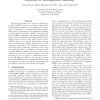Free Online Productivity Tools
i2Speak
i2Symbol
i2OCR
iTex2Img
iWeb2Print
iWeb2Shot
i2Type
iPdf2Split
iPdf2Merge
i2Bopomofo
i2Arabic
i2Style
i2Image
i2PDF
iLatex2Rtf
Sci2ools
116
click to vote
HCW
1999
IEEE
1999
IEEE
Are CORBA Services Ready to Support Resource Management Middleware for Heterogeneous Computing?
The goal of this paper is to report our ndings as to which CORBA services are ready to support distributed system software in a heterogeneous environment. In particular, we implemented intercommunication between components in our Management System for Heterogeneous Networks MSHN1 using four different CORBA mechanisms: the Static Invocation Interface SII, the Dynamic Invocation Interface DII, Untyped Event Services, and Typed Event Services. MSHN's goals are to manage dynamically changing sets of heterogeneous adaptive applications in a heterogeneous environment. We found these mechanisms at various stages of maturity, resulting in some being less useful than others. In addition, we found that the overhead added by CORBA varied from a low of 10.6 milliseconds per service request to a high of 279.1 milliseconds per service request on workstations connected via 100 Mbits sec Ethernet. We therefore conclude that using CORBA not only substantially decreases the amount of time required...
CORBA | Distributed And Parallel Computing | HCW 1999 | Heterogeneous Environment | Invocation Interface |
Related Content
| Added | 03 Aug 2010 |
| Updated | 03 Aug 2010 |
| Type | Conference |
| Year | 1999 |
| Where | HCW |
| Authors | Alpay Duman, Debra A. Hensgen, David St. John, Taylor Kidd |
Comments (0)

